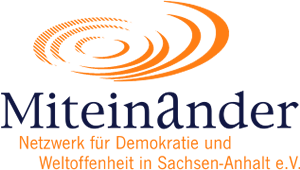Das Jahr 2022 war in Sachsen-Anhalt durch eine hohe Dynamik im Spektrum der extremen Rechten gekennzeichnet. Zweifelsohne wirkte dabei die AfD als dominanter parlamentarischer und außerparlamentarischer Akteur.
Sachsen-Anhalts „Neue Rechte“
Das Bundesland ist seit langem Knotenpunkt der bundesweiten Vernetzung der extremen Rechten in Deutschland. In ideologischer und organisatorischer Hinsicht ist dabei das Milieu rund um den im Saalekreis ansässigen „Verlag Antaios“ und das „Institut für Staatspolitik“ (IfS) ein zentraler Impulsgeber für die strategische Ausrichtung und Formierung rechtsextremer Strukturen auch und gerade im Umfeld der AfD. Dies wurde auch im zu Ende gehenden Jahr deutlich. So trugen die Tagungen und das Sommerfest des „Instituts für Staatspolitik“ in Schnellroda zur Theorie- und Strategieentwicklungen der AfD (nicht nur) in Sachsen-Anhalt bei. Sie richten sich vornehmlich an den akademischen Nachwuchs im Umfeld der AfD, binden darüber hinaus jedoch auch Funktions- und Mandatsträger*innen der Partei. Im Jahr 2022 zum Beispiel tagte man Anfang September im Lichte des Krieges Russlands gegen die Ukraine zum Thema Geopolitik.
Von stärkerer Reichweite als die Akademien des IfS dürften jedoch die multimedialen Aktivitäten des rechtsintellektuellen Netzwerks in Schnellroda sein. Über Vlog- und Podcast-Formate wird das Milieu thematisch, aber auch lebensweltlich-habituell gebunden und mit rechten Inhalten versorgt. Und das Sommerfest des Instituts im Juli zielte auf die Bindung der Leser*innen des Antaios-Verlags und Sympathisant*innen sowohl mit Blick auf die Gewinnung von Kund*innen als auch das Knüpfen neuer politischer Kontakte. Die Arbeit des IfS in den letzten Jahren hatte einen wesentlichen Anteil daran, die AfD politisch sprechfähig gemacht und normalisiert zu haben.
Ein anderes Segment der extremen Rechten, welches jedoch durchaus mit dem zuvor beschriebenen korreliert, wird durch den vormaligen AfD-Fraktionschef im Landtag von Sachsen-Anhalt, Andre Poggenburg, und sein Umfeld repräsentiert. In Kooperation mit der rechten Monatszeitschrift „Compact“ und der extrem rechten Regionalpartei „Freie Sachsen“ suchte Poggenburg Anfang August 2022 den Startschuss für einen vom Milieu ersehnten „heißen Herbst“ des Protests zu geben, in dem er auf seinem Anwesen in Stößen im Burgenlandkreis zu einem Fest lud, an dem auch Vertreter*innen des Querdenken-Milieus teilnahmen. Erkennbar diente das Sommerfest in Stößen der Vorbereitung und Mobilisierung zu einer rechten Demonstration in Leipzig im September, die als Auftakt zu einem neuen Protestzyklus gedacht war.
Die Rolle der AfD
Es war und ist aber vor allem die AfD, die in Sachsen-Anhalt versucht, vor dem Hintergrund der gesamtgesellschaftlichen Krisensituation die sich formierenden Proteste für ihre politischen Zwecke zu nutzen. So war die Partei frühzeitig bestrebt, das Thema Corona und die damit verbundenen politischen Widersprüche aufzugreifen und davon zu profitieren. Im Sommer 2021 blieben ihre diesbezüglichen Aktionen ohne wirkliche gesellschaftliche Resonanz. Dies änderte sich in der zweiten Phase der Corona-Proteste ab dem Spätherbst 2021. In den Regionen Sachsen-Anhalts war die AfD innerhalb dieser Proteste teils offensiv, teils defensiv präsent. In einigen Orten (z.B. Bitterfeld, Querfurt) trat sie offiziell als Anmelderin und Organisatorin der Proteste auf.
Corona-Proteste und „Heißer Herbst“
Zum Jahreswechsel 2021/2022 stiegen sowohl die Anzahl der thematischen Kundgebungen und anderen Formen öffentlicher Versammlungen, wie Mahnwachen und selbsterklärten Spaziergängen, als auch der teilnehmenden Personen massiv an. Genaue Zahlen sind für den gesamten Zeitraum nicht zu nennen, da an zu vielen Orten an zu vielen Tagen öffentlich demonstriert wurde. Ende Juli 2022 wurde in Veröffentlichungen des Innenministeriums die Zahl von deutlich über 2.000 öffentlichen Aktionen von Corona-Leugner*innen innerhalb eines Jahres von Mai 2021 bis Juni 2022 genannt. Viele dieser Demonstrationen wurden zwar öffentlich in den sozialen Netzwerken beworben, aber vielfach vor Ort nicht als Versammlung angemeldet. Dabei waren dort neben verschiedensten Verschwörungsideolog*innen auch alle Spektren der extrem Rechten von AfD, NPD, Reichsbürgerinnen und völkischen Neonazis vertreten. Eine Distanzierung der „bürgerlichen“ Demonstrant*innen gegenüber offen auftretenden Rechtsextremen war dabei nicht zu beobachten.
Nach dem weitgehenden Ende der pandemiebedingten Beschränkungen nahm das Protestgeschehen im zweiten Quartal zunächst erneut ab. Der russische Krieg gegen die Ukraine hat den sozialen Protesten in Sachsen-Anhalt jedoch zeitweise eine neue Dynamik verschafft. Im Spätsommer 2022 erreichte die Mobilisierung im Zuge der Debatte um einen Gaspreisdeckel seinen Höhepunkt mit über 12.000 Teilnehmer*innen an etwa 40 Orten. Hotspots des Protests waren die urbanen Zentren Halle und Magdeburg. Aber auch in Städten wie Aschersleben, Querfurt, Halberstadt oder Salzwedel kam es wöchentlich zu Kundgebungen und Demonstrationen. Im weiteren zeitlichen Verlauf des Herbstes zeigte sich jedoch, dass die Erwartungen extrem rechter Milieus an die Mobilisierungsfähigkeit des Themenkomplexes Energiekosten, Inflation und Krieg sich vorerst nicht erfüllten. Die Zahl der Kundgebungen und ihrer Teilnehmer*innen ging in Sachsen-Anhalt nach Anfang September deutlich und stetig zurück.
Getragen wurden die Proteste vor dem Hintergrund des russischen Krieges gegen die Ukraine im Kern von jenem Milieu, das bereits im Zusammenhang mit den Corona-Protesten zu den politischen und organisatorischen Impulsgeber*innen gehörte. Hierzu zählen souveränistisch ausgerichtete Ideolog*innen der „Reichsbürger“, Neonazis, Querdenker*innen und Esoteriker*innen. Inhaltlich standen bei den jüngsten Protesten weiterhin verschwörungsideologische Krisenerzählungen, diesmal im Zusammenhang mit dem Themenkomplex Energiekosten, Inflation und Krieg, im Mittelpunkt.
Zentrale Forderungen von AfD und extremer Rechte waren die Öffnung von Nord Stream 2 und die Aufhebung der Sanktionen gegen Russland. Auch wurde offene Sympathie für Russland bekundet, insbesondere von Vertreter*innen der AfD. So ließ etwa der AfD-Landtagsabgeordnete Hans-Thomas Tillschneider verlauten, „unsere Feinde sitzen nicht in Moskau, sondern in Magdeburg und Berlin“. Die Affinität zu Russland zeigte auch eine Reise von Hans-Thomas Tillschneider und Daniel Wald, beide Landtagsabgeordnete in Sachsen-Anhalt, gemeinsam mit Landtagsabgeordneten der AfD aus Nordrhein-Westfahlen in die von Russland besetzten Gebiete der Ukraine bzw. nach Russland, die bundesweit für Schlagzeilen sorgte. Man habe sich, so rechtfertigten sich die AfD-Mandatsträger, ein eigenes Bild der Lage machen wollen. Während die die nordrheinwestfälischen Landtagsabgeordneten sanktioniert wurden, blieb die Reise für die AfD-Abgeordneten aus Sachsen-Anhalt ohne Konsequenzen.
Insgesamt erfuhren Rhetorik und Argumentation der AfD in Sachsen-Anhalt im Kontext des Krieges gegen die Ukraine eine weitere Zuspitzung. Diese spiegelt jedoch die seit Jahren im Landesverband der Partei konsensfähige offen rechtsextreme Orientierung und stellt somit keine neue Stufe der Radikalisierung dar.
Der Blogbeitrag wurde auch Ende September auf Belltower.News, der Online-Plattform der Amadeu Antonio Stiftung veröffentlicht.
